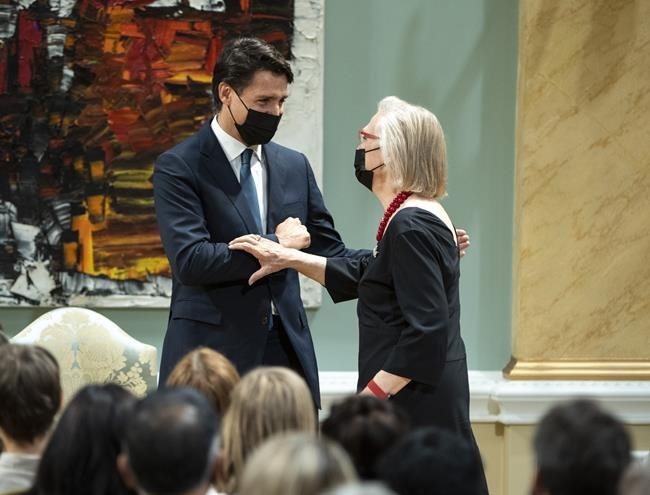OTTAWA — Prime Minister Justin Trudeau's freshly appointed cabinet includes a new ministerial post to tackle his election promises on mental health and addictions.
Carolyn Bennett, who served recently as minister of Crown-Indigenous relations, has been tapped for the mental health and addictions portfolio.
The role is hived off from the rest of the health portfolio, which will be managed by former Treasury Board president Jean-Yves Duclos.
"A lot of people, I think, have seen that mental health has become a parallel pandemic and that we actually need to really dive in and make sure there is a mental-health strategy across all government departments, but also with the provinces and the territories," Bennett said at a news conference Tuesday.
The Liberal platform promised a new federal transfer of $4.5 billion over five years to provinces and territories to provide accessible, free mental-health services.
Advocates for mental health, including the Canadian Mental Health Association, applauded the added focus in cabinet on improving mental-health care in Canada.
"We have a unique opportunity in this moment in time to address long-standing gaps in our mental-health system: from the lack of timely access and culturally sensitive care, to care gaps in remote locations and patchwork programs," Margaret Eaton, CEO of the Canadian Mental Health Association, wrote in a statement.
Rates of depression and anxiety have increased across the board during the pandemic, according to the Mental Health Commission of Canada, and isolation measures weighed heavily on those who were already living with mental illness or problematic substance use prior to COVID-19.
"This appointment is a critical step as we work to improve the mental health and substance-use health of all people in Canada," said Michel Rodrigue, president of the Mental Health Commission of Canada.
Bennett will also be tasked with development of a strategy to end the opioid crisis.
In addition, the promises include eyeing other government policies through a mental-health lens.
Trudeau vowed to review access to the disability tax credit, as well as other federal benefits and programs, to ensure mental-health challenges are among the qualifications. He also promised to include mental health as a specific element of occupational health and safety under the Canada Labour Code.
NDP Leader Jagmeet Singh said the new position is important "now more than ever" due to the pandemic and its effect on mental well-being.
Conservative MP Todd Doherty tweeted that adding the ministerial position is not a "silver bullet solution."
"We need urgent and concrete action," Doherty wrote, calling on the new minister to create a national suicide prevention hotline and stable funding for provincial mental-health care and grassroots mental-health organizations.
Prior to her election in 1997, Bennett, who will also serve as associate minister of health, was a family physician and assistant professor in the department of family and community medicine at the University of Toronto.
She received the first Champion of Mental Health Award from the Canadian Alliance on Mental Illness and Mental Health in 2003.
Meanwhile Duclos, who takes over as health minister from Patty Hajdu, will have to negotiate with provinces and territories that have demanded the federal government accept a greater share of the cost of delivering health care.
Hajdu became the face of the federal government's response in the early days of the COVID-19 pandemic.
As Canada moves into the next phase of pandemic recovery, the federal government will have to work closely with premiers to come to a new agreement on health-care transfers.
The pandemic has put stress on provinces’ already stretched health systems, leaving intensive care and emergency rooms overcrowded and health workers burnt out.
Premiers seek a meeting with Trudeau to ask the federal government to immediately boost its share of health-care costs from 22 to 35 per cent — an increase of about $28 billion this year.
They're also asking for minimum funding increases of five per cent annually, arguing the current plan of three-per-cent jumps in spending means transfers don't keep pace with yearly cost increases.
Duclos was a professor and director of the department of economics at Laval University prior to his election in 2015.
He is also responsible for the Public Health Agency of Canada and will work closely with chief public health officer Dr. Theresa Tam as Canada navigates the fourth wave of the pandemic.
This report by The Canadian Press was first published Oct. 26, 2021.
Laura Osman, The Canadian Press



